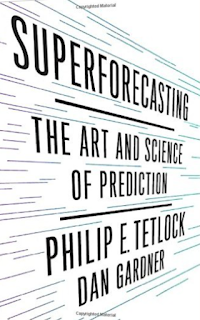If there is one new book to read for investment management, Superforecasting: The Art and Science of Prediction by Philip Tetlock and Dan Gardner is the one. They never mention investment management or finance, but the insights from their work on "superforecasters" is extremely useful and will help anyone who has to make predictions for a living. Professor Tetlock has had one of the more interesting research careers with a focus on how well forecasters actually perform with real questions of high uncertainty. His conclusion in earlier work is that most are poor forecasters.
The current book talks about a long term project which uses volunteers to make tournament forecasts on a wide range of topics. It was part of a large government project to see if superforecasters could be found, analyzed, and natured. It is a deep work that has been ongoing for years, but tells us that good forecasting can be made and the characteristics of the forecasters can be measured. Unfortunately, the number of great forecasters is small. The good news is that forecaster who work at can get better and there are a set of characteristics for those who are good.
The heart of the work is finding and analyzing those individuals who have good skills. The authors were able to identify these key skills for forecasting through grouping those who have done well in the tournaments. Some of these skills may be very intuitive yet the combination across four major areas tells us what we should be looking for in forecasters.
Good forecasters have these skills or traits:
Philosophical outlook - They have an overall philosophical outlook to the problem of forecasting.
- Cautious - The good forecasters are cautious and not quick to reach conclusions. They realize that nothing is certain.
- Humble - They are humble and understand that they are likely to fail and that they do have limitations. The world is complex and hard to know.
- Non-deterministic - The forecasters have a strong sense that events may not be easily understood through simple cause and effect. Things happen.
Abilities and thinking styles - There is a specific style of thinking that makes for better forecasting.
- Actively open-minded - Everything should be tested. There are no strongly held beliefs.
- Intelligent and knowledgeable -The good forecasters are naturally curious.
- Reflective -The good forecasters are their own worst critics. They will second guess and challenge themselves.
- Numerate -They may not be quants, but they are comfortable with numbers.
Methods of forecasting - Good forecasters follow a structure for making their bets.
- Pragmatic -They are not ideologues and not wedded to an agenda or view.
- Analytical -They can hold and measure other points of view.
- Dragon-eyed -They have the ability to take other views and synthesize to a new perspective.
- Probabilistic -They can think in terms of odds or degrees of maybe.
- Thoughtful updaters - When provided new evidence and data, they will change their view.
- Good intuitive psychologists -Good forecasters can check for biases and discount emotional point of view.
Work Ethic -
- A growth mindset - Good forecasters believe that hard work will make hem better forecasters.
- Grit - There is a determination to seek the truth and the answer to problems.
Superforecasting is easy to read but filled with useful information. It takes complex issues and make them easy to understand and show that great forecasting is not innate but can be learned and developed like other skills.

No comments:
Post a Comment